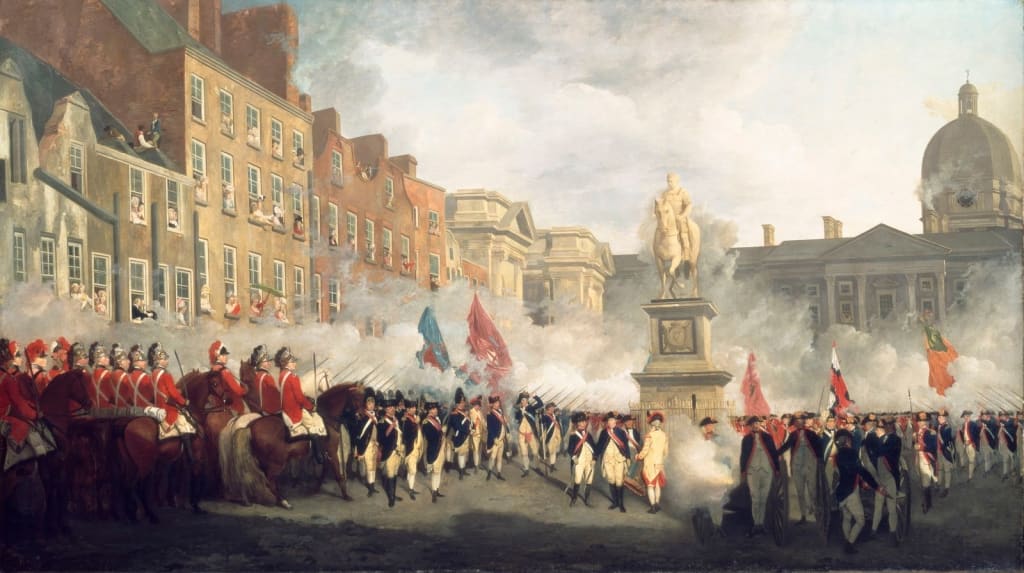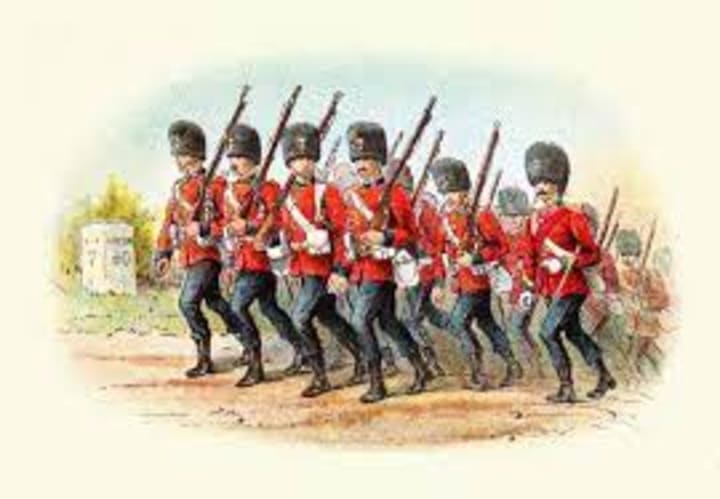The American War of Independence
Real History

The early morning sun broke through the dense clouds and cast a golden glow over the rolling hills of Lexington, Massachusetts. It was April 19, 1775, and tensions between the British soldiers and the colonists had reached a boiling point. The British army had been sent to confiscate the colonists' weapons, and the colonists had gathered to protect their arms.
In the distance, the sound of approaching troops could be heard. The colonists quickly formed lines, muskets at the ready. As the British army came into view, the colonists realized that they were vastly outnumbered. The British soldiers, dressed in red coats and marching in perfect formation, looked intimidating.
The commanding officer of the British forces stepped forward and addressed the colonists. "Lay down your arms and disperse," he said. "Or face the consequences."
The colonists stood their ground, refusing to give up their weapons. Suddenly, a shot rang out, and chaos erupted. No one knew who fired the first shot, but it was the spark that ignited the American War of Independence.
The war that followed was brutal and bloody. The British army, with its superior training and weaponry, initially had the upper hand. But the colonists were fighting for their homes and their way of life, and they refused to back down.
As the war raged on, new leaders emerged. George Washington, a wealthy Virginia planter, was appointed Commander-in-Chief of the Continental Army. His military experience and leadership skills were instrumental in turning the tide of the war.
The Continental Army was made up of farmers, tradesmen, and other ordinary citizens who had never before seen battle. They were poorly equipped and often went without food or pay. But they were determined to fight for their independence.
The war took a toll on both sides. The British army suffered from disease and desertion, while the Continental Army suffered from a lack of supplies and a shortage of troops. But despite the odds, the colonists continued to fight.
One of the most pivotal battles of the war took place at Saratoga in October of 1777. The British army had been trying to cut off New England from the rest of the colonies, but the Continental Army managed to surround and defeat them. The victory at Saratoga was a turning point in the war, and it convinced France to join the fight on the side of the colonists.
The war continued for several more years, with battles taking place from New England to the South. Finally, in 1781, the Continental Army, with the help of French troops, defeated the British army at Yorktown, Virginia. The British commander, General Cornwallis, surrendered, effectively ending the war.
The American War of Independence was a hard-fought battle for freedom that lasted for eight years. It was a war that pitted brother against brother and neighbor against neighbor. But it was also a war that gave birth to a new nation, one that was founded on the principles of liberty and justice for all. And it was a war that changed the course of history forever.

As the smoke cleared and the British soldiers marched out of Yorktown in defeat, a wave of relief and joy swept across the American colonies. The news of the victory spread quickly, and celebrations erupted in towns and cities across the fledgling nation.
The war had taken a heavy toll on both sides. Thousands of soldiers had lost their lives, and countless families had been torn apart. But for the Americans, the cost had been worth it. They had won their independence and secured their future as a free and sovereign nation.
In the aftermath of the war, the newly-formed United States faced many challenges. The country was deeply in debt, and its government was weak and ineffective. But the spirit of unity and determination that had fueled the war continued to drive the young nation forward.
The Founding Fathers, led by George Washington and Thomas Jefferson, worked tirelessly to create a government that would ensure the rights and freedoms of all citizens. They drafted the Constitution, which established a system of government that would provide for the common defense, promote the general welfare, and secure the blessings of liberty for all Americans.
Over the years, the United States has faced many challenges and struggles. But the legacy of the American War of Independence lives on. It is a reminder of the courage and sacrifice of those who fought for freedom, and a testament to the enduring power of the American spirit.
Today, as we look back on the events that led to the birth of our nation, we are reminded of the importance of standing up for what we believe in, even in the face of overwhelming odds. The American War of Independence is a story of hope and resilience, and a reminder that the human spirit is capable of overcoming even the greatest challenges.
As the new nation of the United States of America began to take shape, the world watched with interest and curiosity. Many nations had never before seen a successful rebellion against a colonial power. The success of the American War of Independence inspired other nations to fight for their own independence and to challenge the status quo.
The American War of Independence also had a profound impact on the world of warfare. It was the first modern war fought on a large scale, with soldiers using advanced weaponry and tactics. The war saw the emergence of new military technologies, such as the use of rifled muskets and the creation of the first American navy.
The war also changed the way wars were fought. The Continental Army, made up of citizen soldiers, demonstrated the power of a well-trained and disciplined army that was fighting for a cause it believed in. The British army, on the other hand, relied on traditional tactics and hierarchical structures, which proved to be ineffective against the guerrilla-style tactics used by the colonists.
The legacy of the American War of Independence continues to be felt today. The principles of liberty, equality, and democracy that were established during the war have become the foundation of the American identity. The United States has become a symbol of freedom and opportunity, a beacon of hope to people around the world who are seeking to build a better life for themselves and their families.
The American War of Independence was a defining moment in the history of the United States and the world. It was a war that tested the resolve and determination of the American people, and it was a war that they ultimately won. It was a war that created a new nation, and it was a war that changed the course of history forever.
The American War of Independence also sparked a wave of political and social change throughout the world. The ideas of the Enlightenment, such as individual liberty and natural rights, had a profound influence on the Founding Fathers and the American Revolution. These ideas inspired similar revolutions and movements across Europe, South America, and beyond.
In France, the American Revolution was seen as a symbol of hope and a call to action. The French people were inspired by the American colonists’ success in overthrowing a powerful monarchy and establishing a democratic government. The French Revolution, which began in 1789, was largely inspired by the ideals of the American Revolution.
The American War of Independence also had a profound impact on the relationship between the United States and Great Britain. Although the two nations would go on to become close allies, the war left a lasting bitterness between the former colonial power and its former colony. It would take many years for the wounds to heal, and for the two nations to develop a strong and mutually beneficial relationship.
Today, the legacy of the American War of Independence continues to shape the United States and the world. The principles of liberty and democracy established during the war remain at the core of the American identity. The United States continues to be a beacon of hope and freedom to people around the world, and the ideas of the American Revolution continue to inspire people to fight for their own rights and freedoms.
In conclusion, the American War of Independence was pivotal moment in world history. It was a war that tested the limits of human endurance and determination, and it was a war that ultimately led to the birth of a new nation. The legacy of the American Revolution continues to be felt today, as the ideals of liberty, equality, and democracy inspire people around the world to fight for their own rights and freedoms. The American War of Independence was not just a war for independence, but a war for the fundamental values that define us as human beings
About the Creator
Riyaz Ahamed
Lets Explore





Comments
There are no comments for this story
Be the first to respond and start the conversation.